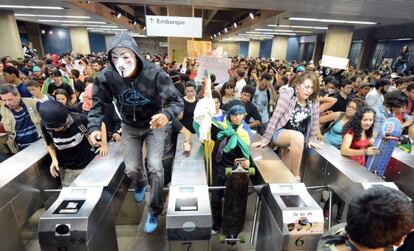Brazil: Can Someone Explain What's Going on Down There?

When Americans think of Brazil, protests are farthest from their minds. Rather, soccer and carnival-and, more recently, the FIFA World Cup and the Olympics -have, for better or worse, been the images most closely associated with the South American giant.
Imagine, then, Americans' surprise upon being presented with images of massive and sustained protests -some violent- all across Brazil.
Americans have heard of policemen throwing their weapons into protestors' bonfires and joining the movement; of thousands of Brazilians turning their backs during the singing of the national anthem at the Confederations Cup on Wednesday; of a young Brazilian woman reaching out to Americans on YouTube, asking them to consider the protestors' demands.
And as U.S. media has increasingly aired footage of empowered Brazilians demanding substantive change, Americans can't help but wonder where this all is coming from.
Answering that question, however, has not proved simple.
When U.S. media began covering the protests after Monday's protests, reports focused on the bus fare hike as the primary -if not the only- driver of popular dissent and demonstration. As has become increasingly clear, the fare increase was just the tip of the iceberg.
With limited news media coverage of the story and still less detailed information about protestors' demands, Americans quickly turned to social media, connecting with their friends and family abroad to learn more. Facebook, Twitter, and YouTube unsurprisingly told a different story.
Through those sources, Americans gained access to the voices and perspectives of the protestors themselves.
Though the fare hike clearly most heavily impacted the poor, working population, it became clear that the country's youth -its students- were among the most vocal protestors. And the widespread nature of the protests and demographic diversity of those participating in them turned Americans' attention to Brazilians' concerns, which proved far greater than the cost of public transportation.
More and more, media -both social and otherwise- have conveyed the protestors' demands for improvements in health, education, and public transportation, as well as an end to the reckless government spending and corruption that have long plagued the system.
And though the protests by and large have remained peaceful, Americans have been confronted with images of protestors running from police wielding water cannons and tear gas-and aiming both, at times, at journalists.
Avaaz.org, an online activist network, has even organized a petition demanding President Dilma Rousseff's impeachment -and the petition has already garnered over 270,000 signatures.
And again, the U.S. audience found itself surprised, having heard Brazil touted as the South American success story -a fast-growing economy and stable political system whose regional and global influence would only increase, and who would show that success to the world by hosting the upcoming Olympics and World Cup.
But now, Brazil is looking increasingly like Chile, whose fiscal and economic success over the past decade has been largely overshadowed by the country's own protest movement -one that has been ongoing, despite periods of lull and resurgence, since 2011.
If anything, what Chile's protest movement has taught us is that growth is not a panacea for a country's problems -far from it. While a state's economic success certainly enables its government to address domestic issues, that same success increases the pressure leaders face to do just that.
In Brazil, as in Chile, that pressure has translated into a demand for services: infrastructure, healthcare, education, and social programs.
A YouTube video of a young Brazilian woman demonstrates the extent of those demands. The woman explains that Brazil's economic success brought with it heightened expectations for the government's capacity to provide for its citizens.
And, as the government has funneled US$14 billion into the facilities for the World Cup and the Olympics, popular impatience with the government's hesitation to use that money instead for a population desperately in need of better schools and expanded social welfare programs has skyrocketed.
In a sense, then, perhaps Brazil is a victim of its own economic success. It seems that the Brazilians who are filling the streets and pushing for change are asking no more than that their government use its resources to provide its people with the services they sorely lack.
For all that Americans have reacted with surprise at the eruption of protests, perhaps, then, that surprise is unwarranted.
To be sure, Americans are eager to see what happens next. The protestors have made their concerns clear -and their presence on the international stage grows each day.
So now, the United States is waiting and watching, curious to see how President Rousseff will respond. Hopefully, she will be able to mobilize her government and its considerable resources to both meet and manage the expectations of the Brazilian population.
What she undoubtedly knows -and what protestors often forget- is that political and social change is inevitably an incremental process. We hope she can bring the protestors on board.
Tu suscripción se está usando en otro dispositivo
¿Quieres añadir otro usuario a tu suscripción?
Si continúas leyendo en este dispositivo, no se podrá leer en el otro.
FlechaTu suscripción se está usando en otro dispositivo y solo puedes acceder a EL PAÍS desde un dispositivo a la vez.
Si quieres compartir tu cuenta, cambia tu suscripción a la modalidad Premium, así podrás añadir otro usuario. Cada uno accederá con su propia cuenta de email, lo que os permitirá personalizar vuestra experiencia en EL PAÍS.
¿Tienes una suscripción de empresa? Accede aquí para contratar más cuentas.
En el caso de no saber quién está usando tu cuenta, te recomendamos cambiar tu contraseña aquí.
Si decides continuar compartiendo tu cuenta, este mensaje se mostrará en tu dispositivo y en el de la otra persona que está usando tu cuenta de forma indefinida, afectando a tu experiencia de lectura. Puedes consultar aquí los términos y condiciones de la suscripción digital.








































